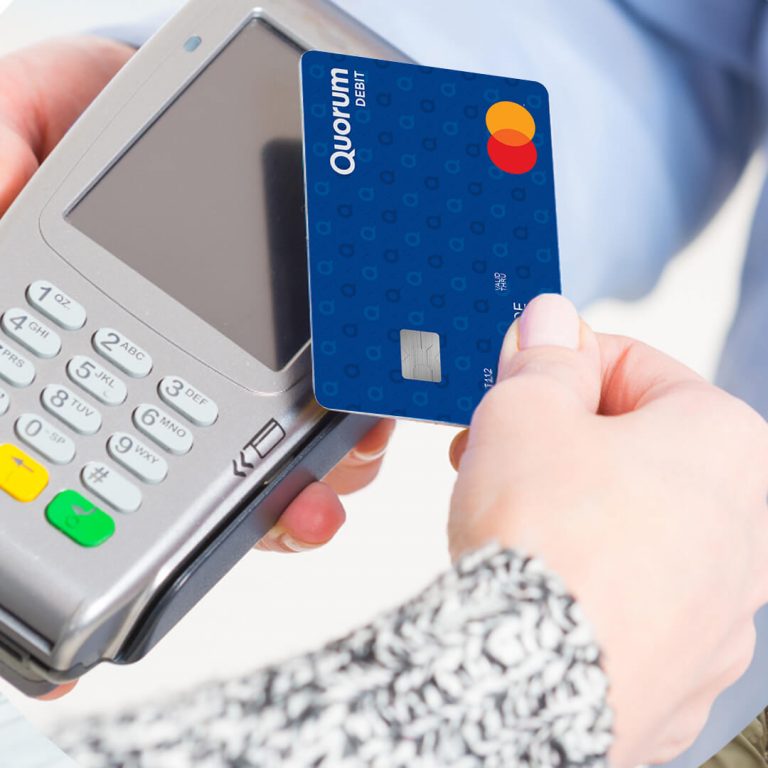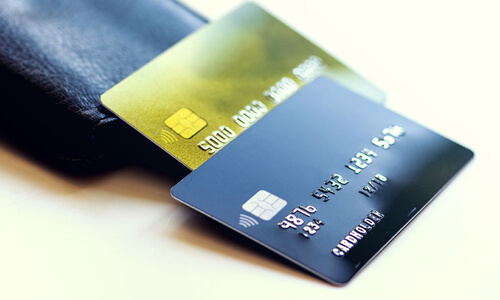If you still view your debit card as only an ATM card, consider some of the advantages of using it for daily purchases. We’ve listed some of the most popular benefits below.
Debit cards mean you’re only spending what you have available.
Using your debit card to make a purchase is as simple as using your credit card; but, because the money is coming directly out of your checking account, you’re only spending what you have available. You’re not putting off paying for things until later or accumulating interest if you don’t pay your balance in full, which is an easy habit to get into with a credit card—and one that can wreak havoc on your budget. And speaking of budgets…
Debit cards can help you stick to your budget.
If you use your debit card primarily as an ATM card to get cash and use the cash for purchases, it can be very easy to go through it and not remember exactly where it went (especially if you have kids or a spouse who regularly take money out of your wallet). (If you want to keep a little cash on you at all times, many retailers will let you add a small amount to your debit purchase so that you can get cash back.)
When you make a purchase with your debit card, on the other hand, the transaction is posted in your checking account activity, often immediately. There are also many free budgeting software options available that make tracking your money and purchases easy, including apps you can install right on your phone. These apps allow you to easily record each purchase. You can also review and track how much money you’re spending in various categories (food, entertainment, office supplies, etc.) and in specific locations (like particular stores or restaurants).
Debit cards are convenient.
Debit cards are accepted at millions of locations throughout the U.S. and around the world, and in addition to being fast and easy to use, they:
- Eliminate the need to dig around in your wallet for cash and coins.
- Are faster than writing a check.
- Eliminate the need for ID beyond entering your Personal Identification Number (PIN). (Often, that’s not even required if you aren’t getting cash back.)
For even greater convenience, you can add your debit card information to your phone’s digital wallet (like Apple Pay, Android Pay or Samsung Pay). All you have to do is swipe or tap your phone at checkout to make a purchase: no physical card required.
It’s easy to avoid overdraft issues.
You may be hesitant about using debit cards because you’re afraid you’ll accidentally overdraw your account. That doesn’t have to happen. Here are some other simple tools and precautions that can help you avoid overdrawing your checking account:
- Card Alerts
- Overdraft Protection
If you add overdraft protection to your checking account, such as a Checking Reserve Line-of-Credit (as there are different levels of overdraft protection), you can avoid accidentally overdrawing your account. If a check or any type of debit would cause your account to go into a negative balance, funds are automatically transferred into the account to pay it.
- Always Get Receipts
You should receive a receipt for any debit card transaction you make. Hold on to that until you see that the transaction has posted correctly to your account. If you don’t get a receipt for some reason (as happens at gas pumps from time to time) or it’s illegible, jot down the amount of your purchase. In nearly all cases, debit card transactions post accurately. However, it’s always wise to have a receipt or other record of your purchase.
Some simple safety precautions:
What if your card is lost, stolen or accessed by an unauthorized user? Notify your financial institution immediately. They can shut down that card and issue you another one. They can also begin an investigation if you believe the card or PIN was stolen.
Don’t make it easy for an unauthorized user to get cash using your card. Choose a strong PIN (something difficult for others to guess or remember) and don’t share it with anyone. No one in a store or even at your financial institution should ever ask you for your PIN. Never have it written down on or anywhere near your card.
Most card terminals have privacy shields for when you enter your PIN. However, always exercise basic caution to make sure no one’s looking over your shoulder.
It’s also important to sign the back of your card as soon as you receive it (it’s actually not valid if it isn’t signed). Your signature also creates an additional barrier between your money and a would-be thief.
Sometimes checks are still necessary (and even the best choice).
There are times when you still may need to write a check. Maybe your child’s soccer league requires checks for their dues. Some smaller service providers—like landscapers, handymen and dog walkers—only take cash or checks. When you write a check, just remember to record it wherever you track your checking account transactions. [Note: Quorum’s FREE Bill Pay service will send out checks on your behalf!]
Checks can be the best choice if you need an easy way to show that a payment was received and processed. Most financial institutions provide images of both the front and back of checks once they’ve cleared the recipient’s account.
Just remember that depending on where the recipient takes the check and when, it could post to your account within a day—or not for weeks. Never write a check in anticipation of having the funds in your account by the time it reaches your financial institution. We’ve probably all done this at one time or another, and usually it works out fine. However, if it doesn’t, it can cause a lot of problems—like bounced checks and overdraft fees.
It’s wise to incorporate debit cards into your financial life, along with cash, checks and credit cards. All have their advantages in different situations. By being a smart debit card user, you can increase your spending flexibility and still keep a close eye on your money.






Comments Section
Please note: Comments are not monitored for member servicing inquiries and will not be published. If you have a question or comment about a Quorum product or account, please visit quorumfcu.org to submit a query with our Member Service Team. Thank you.